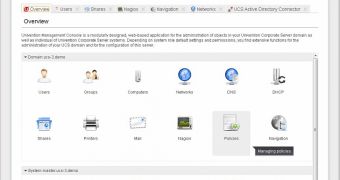Univention, a company that offers management solutions for internal or cloud-hosted IT infrastructures, has released Univention Corporate Server 3.2, a Debian-based Linux distribution.
The new operating system from Univention comes with its own App Center and includes an updated version of Samba 4 for the provision of Active Directory-compatible domain services and a tool for the simple migration of Microsoft Active Directory to UCS.
Univention Corporate Server 3.2 also comes with GRUB 2, which has already been integrated in many other distributions. According to the developers, in an updated system, GRUB 1 remains installed in the master boot record (MBR) and Grub 2 sets up a "Chainload into GRUB" entry, which then loads the actual GRUB 2.
"Anonymous usage statistics on the use of the Univention Management Console are collected when using the free for personal use version of UCS (which is generally used for evaluating UCS). The modules opened are logged in an instance of the web traffic analysis tool Piwik."
"This makes it possible for Univention to tailor the development of the Univention Management Console better to customer needs and carry out usability improvements," said the developers in the official announcement.
Highlights of Univention Corporate Server 3.2:
• The operation of the Univention Management Console has been optimized and simplified and users will find it much easier to work with the distribution; • SAML (Security Assertion Markup Language), an XML-based standard for exchanging authentication information, has been implemented; • The Univention App Center has received a number of improvements; • Samba has been updated to version 4.1; • The Debian base has been updated to version 6.0.8.
More details about the pricing of this distribution for the non-personal use version, as well as other important details, can be found in the official announcement. Download Univention Corporate Server 3.2 right now from Softpedia.

 14 DAY TRIAL //
14 DAY TRIAL //